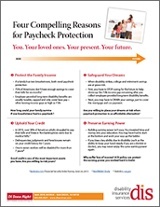 Clients often need something to trigger their awareness and even concern before becoming interested in disability insurance, also known as paycheck protection. Without guidance from a financial professional, few consumers realize two aspects of disabilities and disability insurance. First, the likelihood of suffering a disability is much higher than believed to be. Secondly, the devastation to financial security is much greater than anticipated.
Clients often need something to trigger their awareness and even concern before becoming interested in disability insurance, also known as paycheck protection. Without guidance from a financial professional, few consumers realize two aspects of disabilities and disability insurance. First, the likelihood of suffering a disability is much higher than believed to be. Secondly, the devastation to financial security is much greater than anticipated.
DIS created a downloadable disability education piece for your clients that balances immediate and future needs for DI. Four Compelling Reasons for Paycheck Protection, conveys the facts, educates, and describes how a disability jeopardizes future financial security.
Immediate need for paycheck protection
Use the flier to set the course for your conversation. Establish protecting personal or family income as the most immediate reason to buy disability insurance. Supplement by explaining the most common conditions causing disability and the likelihood of suffering a disability. Most disability claims are for conditions like musculoskeletal or cancer. Often these conditions hit without warning and have little regard for age. The typical 35-year-old woman has a 24 percent of becoming disabled, only slightly higher than the 21 percent probability that a 35 year-old man will disabled during his career. Emphasize the importance of protecting both incomes. Fifty-nine percent of families with children rely on two paychecks to make ends meet.
Side-stepping the financial struggles that often come with a disability is the second immediate reason for paycheck protection. Only 23 percent of families have savings sufficient to cover six months of expenses. Twenty-six percent have no savings whatsoever. The average claim period is between 26 months and 53 months, that amounts to a sum beyond even the most dedicated of savers.
Disability insurance protects the future
The impact of retirement savings on the future can’t be exaggerated. The reality for most of today’s workers is that more of their retirement will be self-funded. Many workers do not have access to an employer-sponsored pension plan and those that do are most likely to have a defined contribution plan rather than a defined benefit plan. If a disability interrupts a paycheck, it likely means interrupted retirement savings and employer pension contributions. Without disability insurance, there will be a lot of financial ground to make-up once the client returns to work.
Sometimes the nature of the disability may prevent the client from returning to a profession with comparable earning power. Many individual disability plans will supplement the income difference. Most employer-sponsored disability plans do not.
Your next client appointment
The next time you talk to a client about disability insurance, use Four Compelling Reasons for Paycheck Protection as a guide. It will stimulate questions and add credibility to the conversation.
DIS has several other downloadable sales tools like our Disability Stat Pack Infographic that are suitable to share with a client. Call DIS today for a quote and more sales ideas. You can count on us through each step from the sale to policy delivery.

